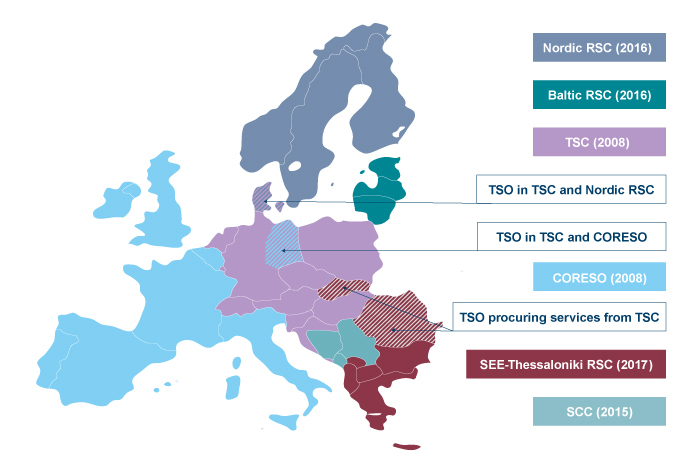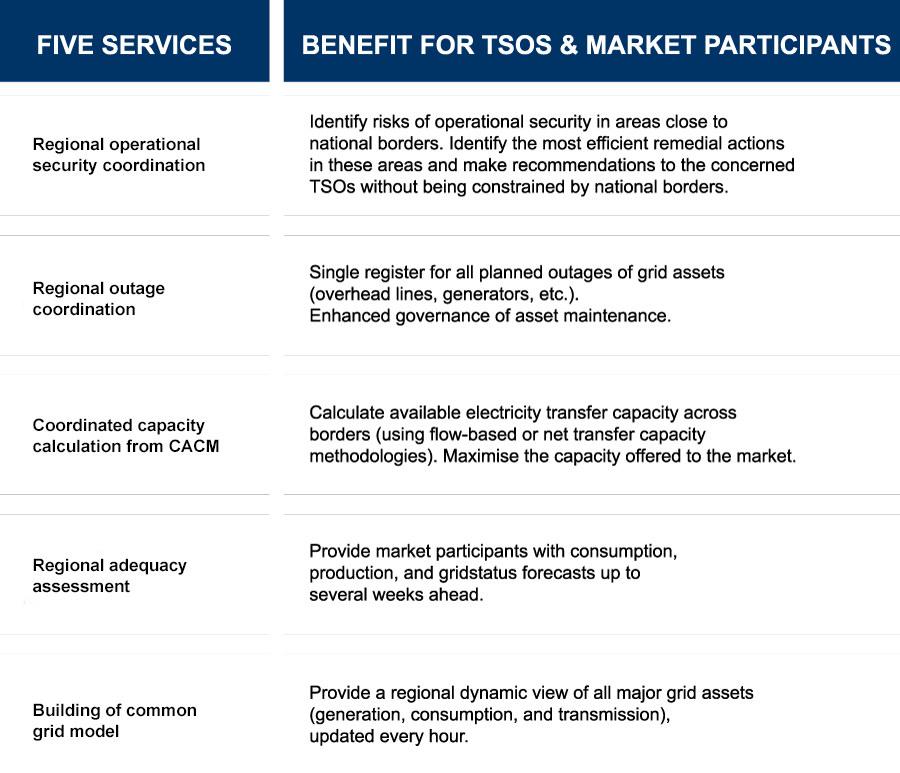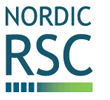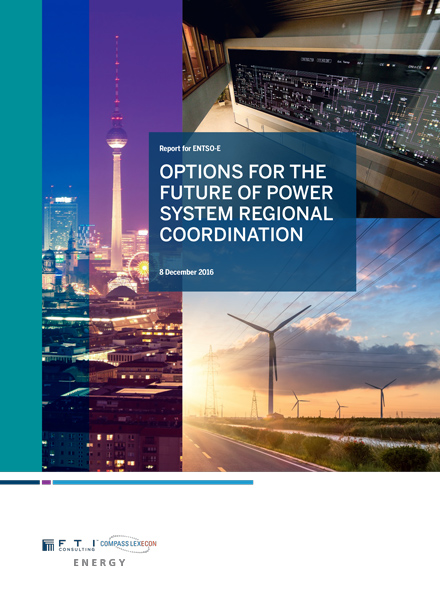How can we integrate at least 45% renewables, maintain the security of the supply, and develop efficient markets in Europe? Action at the regional level is key to each of these three objectives of the Energy Union. How we can best organise cooperation within regions has been a main area of focus for TSOs and ENTSO-E in 2016 and over the past few years.
Expected structure of the six RSCs by end of 2017
ENTSO-E’s Vision for Regions
Regional Cooperation and Governance
ENTSO-E’s vision is that of policy regions bringing political, regulatory, technical, and commercial competences together. As detailed in our policy paper released in April 2016, energy policy regions are based on historical, geographical, and market cooperation. Successful examples of policy regions include the Pentalateral Energy Forum and the Nordics.
These are not to be mixed-up with the functional areas needed to ensure optimal and fit-for-purpose TSO cooperation. The perimeters of functional areas are determined on physical and operational aspects and could differ between functions. Regional security coordinators (RSCs) are functional areas for system operations.
Regional Security Coordinators
Started off in a voluntary manner, RSCs are mandatory today. Initially, TSOs voluntarily committed to intensify regional cooperation to increase the value to customers in reliability, cost efficiency, and sustainability. The RSCs are service providers to TSOs, contributing to the operational security of the electricity system. They deliver five core services to the TSOs. In 2015 and 2016 ENTSO-E members have all signed a multilateral agreement, which states each TSO must contract the following five services. Today, RSCs are already playing a key role in regional TSO cooperation implementing these five services. Decision on system operation remains the responsibility of TSOs, but TSOs will perform their tasks by relying increasingly on the information and services provided by the RSCs.
The TSO coordination through the RSCs increases efficiency in system operation, minimises risks of wide area events, such as brownouts or blackouts, and lowers costs through maximised availability of transmission capacity to market participants.
The System Operation Guideline formalises the name, existence, and role of the RSCs and makes it mandatory for all TSOs to contract the five services. In that sense, the voluntary character of the proactive TSO cooperation has turned into a legal framework, which leaves room for future amendment and for taking stock of dynamic developments and learning from experience. By 2019, all five services must be implemented across Europe. The number of services may evolve over time, once the five initial services are successfully implemented.
Meet the Regional Security Coordinators
By the end of 2016 there were five RSCs established and one in the making.
Coreso
Established: 2008
Seven TSOs: REE (Spain), Elia (Belgium), RTE (France), National Grid (UK), Terna (Italy), 50Hertz (Germany), and REN (Portugal)
Population covered: 279,088,515
Services provided: capacity calculation and operational security analysis
Services in development: outage planning coordination and short- and medium-term adequacy assessment
The tasks performed by security and coordination engineers include monitoring and assessing the security of the electrical system at the regional level and initiating and coordinating appropriate initiatives with the relevant TSOs to ensure the security of the supply on a European scale. Other services relate to operational security in regional market initiatives (market coupling activities, capacity assessment, and capacity calculation).
Transmission System Operator Security Cooperation (TSC)
Established: 2008
Thirteen TSOs: 50Hertz (Germany), Amprion (Germany), APG (Austria), CEPS (Czech Republic), ELES (Slovenia), energinet.dk (Denmark), HOPS (Croatia), MAVIR (Hungary), PSE (Poland), Swissgrid (Switzerland), TenneT TSO (the Netherlands), TenneT TSO GmbH (Germany), and TransnetBW GmbH (Germany)
Population covered: 185,270,801 TSCNET
Services, the service company of the TSC TSOs, coordinates most of TSC’s activities and renders all the tailor-made coordination services for operational planning, forecast data merging, congestion assessment, and capacity calculation for TSOs’ control centres:
- Merging of common grid models
- Capacity calculation
- Security assessment
- Outage planning (extended pilot phase)
- System adequacy (under development)
The IT infrastructure of TSC is ready to be imbedded into ENTSO-E’s future Operational Planning Data Environment (OPDE) and the processing of the Common Grid Model Exchange Standard (CGMES).
Security Coordination Centre (SCC)
Established: 2015
Three TSOs: NOS BiH (Bosnia Herzegovina), CGES (Montenegro), and EMS (Serbia)
Population covered: 12,183,900
Current services provided by SCC:
- Validation and quality improvement of individual grid models
- Merging of individual grid models into the common grid model
- Validation of the common grid model and its delivery
- N-1 security analysis
Starting from 1 July 2016, SCC began to perform the validation of individual grid models, merging and delivering of common grid models at reference time 8:00 and 16:00 CET for the next eight hours of the day.
Nordic RSC
Established: 2016
Four TSOs: Fingrid (Finland), Svenska Kraftnät (Sweden), Statnett (Norway), and energinet.dk (Denmark)
Population covered: 26,144,225
Nordic RSC’s joint office in Copenhagen has been operational since 1 November 2016. The implementation of business processes and IT applications will take place during the first half of 2017. The final go-live for the five services is planned for 1 December 2017.
Baltic RSC
Established: 2016
Three TSOs: Elering (Estonia), AST (Latvia), and Litgrid (Lithuania)
Population covered: 6,173,459
The initial description of the services has been finalised by the end of 2016. The Baltic RSC will perform all five mandatory services with dedicated staff within the offices of each TSO in Tallinn, Riga, and Vilnius.
New RSC in South-East Europe
Expected to be established: 2017
ESO-EAD (Bulgaria), KOSTT (Kosovo*) and IPTO (Greece) are in the process of establishing a new RSC in South-East Europe.
*This designation is without prejudice to positions on status, and is in line with UNSC 1244 and the ICJ Opinion on the Kosovo Declaration of Independence.
Future of Power System Regional Coordination
To analyse options for the future of the coordination of system operations at the regional level in the next decade, ENTSO-E has commissioned an independent study from FTI-CL Energy. The objective was to look beyond the System Operations Guideline and identify several practical recommendations.
The study identified five pillars for an enhanced regional coordination framework:
- a stronger regional cooperation for policy and regulation: Divergence and gaps in policies and regulations are hurdles for further integration and/or causes of inefficiencies in operations or market functioning;
- the RSCs as regional coordinators for system operation: The RSCs are the natural entities to perform coordinated tasks at the regional level for the TSOs, and they are gradually increasing their skills and expertise;
- a governance and decision-making process allowing RSCs to efficiently support TSO tasks pursuing system security and social welfare optimisation at the regional or European level;
- the RSCs as natural bodies to coordinate additional services as needed;
- a geographical modularity focused on efficiency gains to account for regional specificities.
The role of policy regions would be to build the convergence of policies and regulations and to coordinate necessary decisions at the national and regional levels to allow and facilitate the improvements of the regional cooperation of TSOs.
Evolution of regional coordination from 2016 over 2021/2022 and beyond
Regionally Coordinated System Operations
In addition to the coordination services rendered by RSCs, ENTSO-E publishes studies and develops tools to support TSO coordination at the European and regional levels. In 2016, notable projects included the development of new operational procedures for a more secure system. In the last decade, the penetration of distributed energy sources has increased significantly. In the case of high frequency deviations, there is a risk of uncoordinated disconnection of a high amount of distributed generation.
To avoid serious system disturbances, ENTSO-E developed an extraordinary procedure for frequency monitoring and countermeasures in the case of large steady-state frequency deviations. This coordinated procedure between TSOs is intended as a guideline for real-time operators in control rooms and will further guarantee the safety of the grid by:
- sharing information concerning frequency deviations, which otherwise could potentially initiate cascading events on the interconnected grid (load shedding, generation disconnection, separate network, etc.);
- reducing significant frequency deviations with predefined/prepared remedial actions proposed and implemented by TSOs.
Other projects in 2016 include the publication of a report on frequency stability evaluation criteria for the synchronous zone of Continental Europe, analysing the effect of reduced system inertia caused by an increased amount of non-synchronous generation.
Regional Agenda: ENTSO-E’s Regional Conferences 2016
The Baltic regional conference (1st–2nd June, Vilnius) welcomed more than 270 attendees from the three Baltic states and from the Nordics.
The CEE regional conference (22nd–23rd September, Bratislava) welcomed over 150 participants from CEE and its neighbourhood. The conference clarified the progress of market integration between Central-East and Central-West Europe, the developments of the CWE-CEE market coupling, the bidding zone study, regional system adequacy, and infrastructure needs considering the security of the supply and loop flow-related challenges, the RSCs and the need to strengthen TSO-DSO cooperation in the region.
The SEE regional conference (2nd–3rd November, Thessaloniki) welcomed about 200 participants from over 20 countries and focused on the steps needed to overcome market fragmentation in SEE, on exploiting opportunities to foster liquid cross-border markets through strengthened regional cooperation and synergies with solutions and models, such as the well-established CESEC Initiative, as well as on the need to cooperate further with the Energy Community to support the Western Balkan 6 initiative.
Next to each conference, ENTSO-E teamed up with the Florence School of Regulation to offer executive training, targeting senior-level representatives from TSOs, NRAs, and ministries to address the specific needs and market challenges of each region.
Despite the very complex and diverse contexts at the national level and within regions, regions will allow us to move faster and to test and spread innovative solutions towards achieving the common objective of a single energy market. ENTSO-E plans to continue with this regional approach and outreach in the coming years through similar regional events in other parts of Europe.








